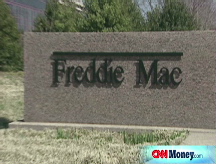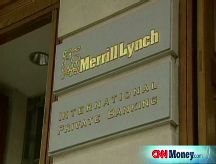Time to lock in your mortgage rate
Home buyers may find big savings in locking in mortgage interest rates.
| 30 yr fixed | 3.80% |
| 15 yr fixed | 3.20% |
| 5/1 ARM | 3.84% |
| 30 yr refi | 3.82% |
| 15 yr refi | 3.20% |
NEW YORK (CNNMoney.com) -- Since mortgage interest rates are on the rise, home buyers can save considerable cash by locking in a reasonable rate when they find one.
During the housing boom, interest rates were extremely low - generally between 5.5% and 6.5% - and very stable. So borrowers often didn't bother to ask lenders to lock in their rates regardless of market fluctuations. If one good interest rate deal disappeared, another one was generally right around the corner.
But today the mortgage market is very volatile, and rates are trending upwards. So losing out on a good deal may mean it's gone forever. If buyers see a bargain, say experts, they should pounce.
"If you hear of a rate that seems to be much better than the rest of market, get it in writing and lock it in," said Steve Habetz, a veteran mortgage broker in Connecticut.
Mortgage giant Freddie Mac (FRE, Fortune 500) reported Thursday that the average rate for a 30-year fixed stood at 6.52%, up from less than 6% in May.
A panel of analysts surveyed by Bankrate.com - including Cameron Findlay, the chief economist for LendingTree.com; Mick Larson, real estate analyst at Weiss Research; and Dan Dowling, president of United Mortgage Capital Corp. - expects rates to go up in the next six weeks.
With the threat of inflation growing and investors wary of buying mortgage securities, other forecasters have predicted rates will hit at least 7% by the end of the year.
For every half point interest rate increase, the monthly payment on a typical mortgage of $200,000 jumps nearly $70. That adds up to more than $800 a year, and $8,000 in the first 10 years of a 30-year mortgage alone.
Locking in a rate is easy, as long as you have a contract or at least a binder on a home. Just tell your mortgage broker and he or she will give you a commitment in writing. Locks are available for as long as 60 days, according to Habetz, at very low cost.
Locking in for 60 days may cost only an eighth of a point extra, turning a 6.5% loan into a 6.625% one. Paying that extra eighth of a percent makes sense if the locked rate is below market, or if you expect rates to rise.
"More than 60 days and the lender is usually looking for cash up front," said Habetz.
Habetz had an offer from Wells Fargo (WFC, Fortune 500) several weeks ago that beat anything else available. It was for a 5-year adjustable rate mortgage with an introductory rate of 4.875% - at least a full percentage point lower than competing offers.
"It lasted only two or three days," he said, "and all we had time to do was to get the customers we were already working with into the loan."
Those customers probably saved themselves $5,000 or so for every $100,000 they borrowed over the first five years. The amazing part of this story, to Habetz, was that not all his clients took advantage of the offer.
"Some of my customers said, 'That's an attractive offer. If it's that good, it will probably get better,' " he said.
Wrong. It only got worse, and those people locked themselves out of a great deal.
But locking in your rate isn't entirely risk-free. After all, rates might actually go down.
"When rates go down," said Habetz, "most lenders won't take [your rate] down with them unless rates drop substantially. Then they may give you the new rate plus an eighth of a point."
But that scenario appears unlikely.
Concerns about inflation are helping to push rates higher. "Inflation has gone from the back burner to the front," said Greg McBride, a senior financial analyst for Bankrate.com.
At the same time, nervous investors in mortgage backed securities, are demanding higher rates for buying these bonds in what they deem a very risky market. That translates into higher rates for borrowers.
So locking in a good deal now should mean a lower rate for most borrowers. And besides saving them money, a lock should take some of the uncertainty out of financing a home purchase, since buyers can determine exactly what their monthly home ownership expenses will be several weeks before closing.
"There are times in your financial life when you should be aggressive and there are times when you should be conservative," said McBride. "When you're buying a house and looking at mortgage rates, that's a time to be conservative." ![]()




